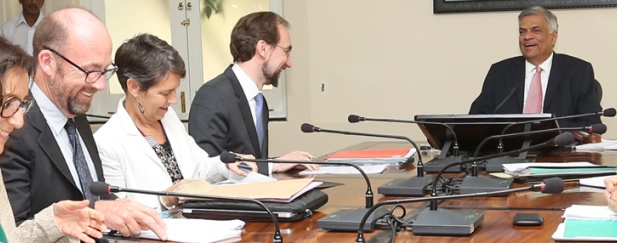UN High Commissioner for Human Rights, Prince Zeid Ra’ad Al Hussein said today that though the Office of the High Commissioner for Human Rights (OHCHR) makes a recommendation on the judicial process into alleged war crimes or on the involvement of foreign judges, it was the sovereign right of Sri Lanka to decide.
He told a news conference held at the UN Office in Colombo, that the views of the Sri Lankan Government on foreign judges have been made known.
“But as we discussed this with them, we know that they are looking at various options within the limits of what they describe as their preference. Whatever that we see from our side, it’s your sovereign right to decide,” UNHR Chief said.
However, he said at the end of the day whatever Sri Lanka did, it should make sure that justice were served to all the victims, whose human rights have been violated.
“It’s not about what the UN says is good or bad. What matters at the end is that justice is served to victims whose parents, children and siblings had been lost. It is their determination what matters, that they are convinced that the government has done enough. And for that reason consultation is vital for Sri Lanka,” the UNHR Chief said.
He said Sri Lanka has many excellent judges, lawyers, and law enforcement officials but over the years the judiciary had become highly politicised, unbalanced and unreliable and that the country’s history over the past few decades had been littered with judicial failures and virtually all Sri Lankans recognize this.
“The Prime Minister has also commented on it at great length and with admirable candour, during a January 27 debate in Parliament. Virtually every week provides a new story of a failed investigation, a mob storming a court-room or another example of a crime going unpunished. Particularly, sexual violence and harassment against women and girls is poorly handled by the relevant State institutions — especially when the alleged perpetrators are members of the military or security services — and, as a result it remains all too widespread,” he said.
The UNHR Chief said it was for these reasons that the report and the Human Rights Council resolution suggested international participation in the accountability mechanisms set up to deal with international crimes and gross human rights violations committed by individuals on both sides.
“This is a practical proposal to solve the very real and practical problems I mentioned earlier. But it is only one aspect — albeit a very important one — of the broad range of measures outlined in the 2015 UN report and resolution and the extent to which it has been allowed to dominate the debate on Sri Lanka in recent days is unfortunate. Extreme nationalistic tendencies lay at the heart of Sri Lanka’s conflict, and they should not be allowed to undermine the country’s long term chances of recovery,” he said.
Meanwhile, when a journalist asked whether former President Mahinda Rajapaksa would be brought before an international war crimes court, the UNHR Chief said certain mechanisms should be established to confirm whether systemic violations or planned prosecution had been taken place.
“The process is a step by step one. There is no invocation of international investigation into alleged war crimes and that the judicial process is going to be a Sri Lankan one,” he said. (Lahiru Pothmulla)
